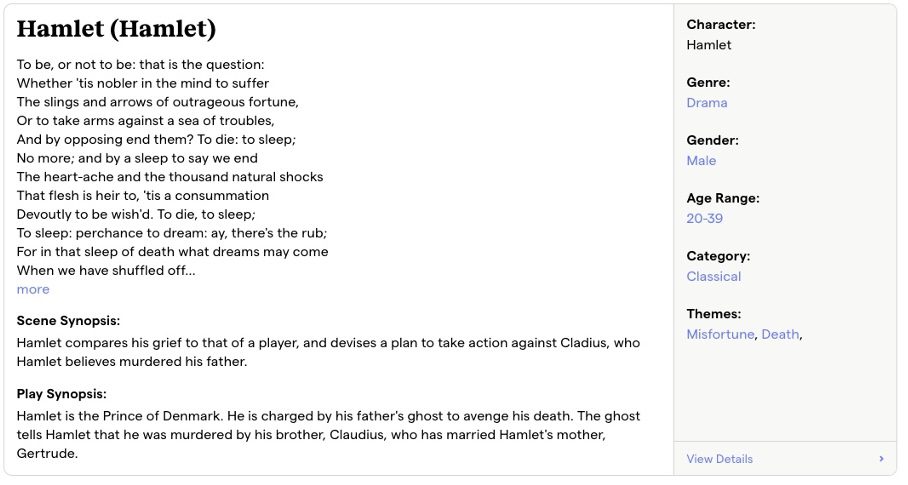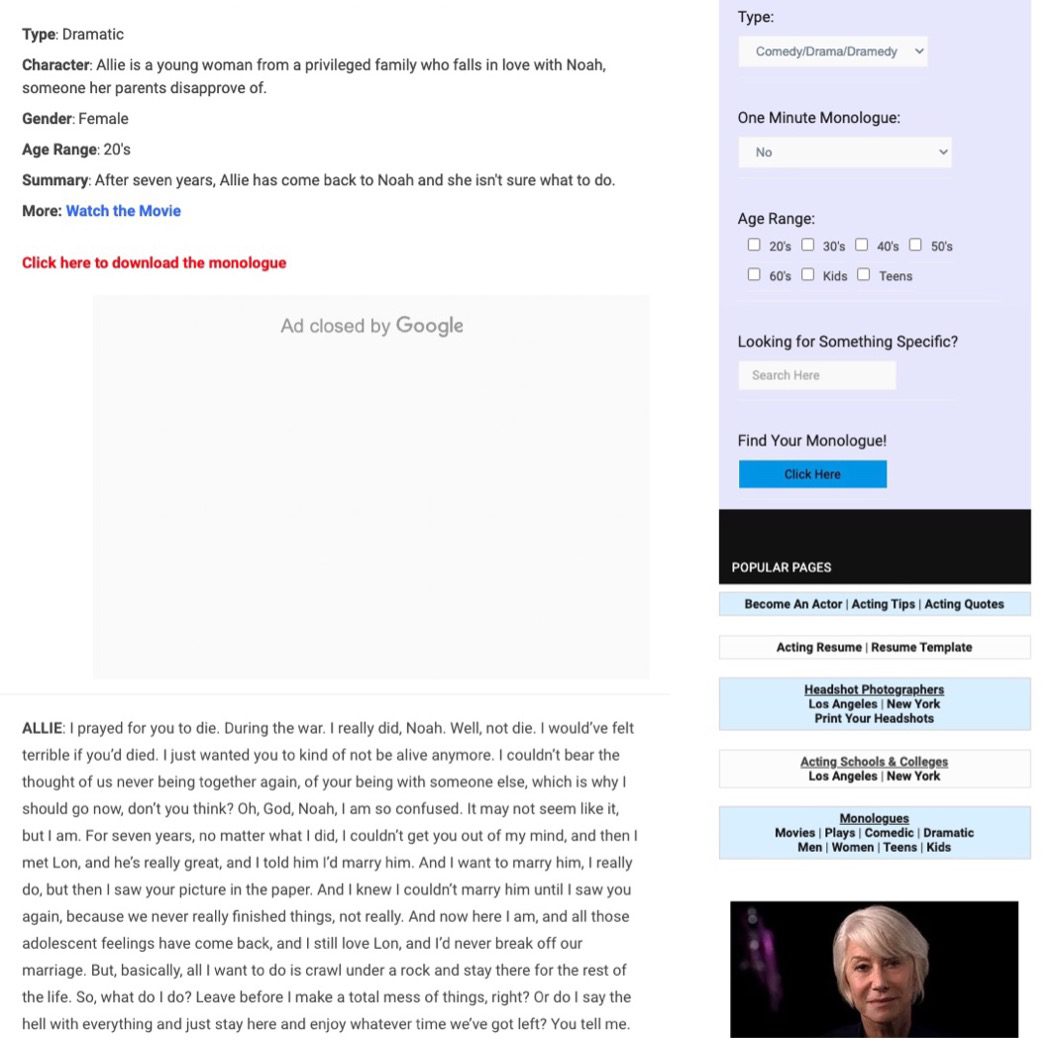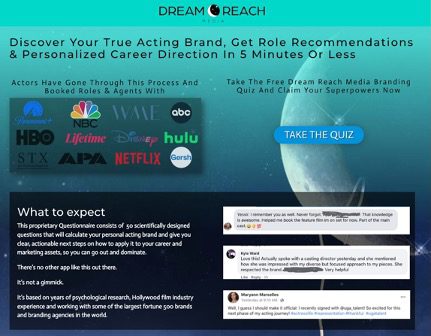Whether it’s to apply to an acting school, a play or submit a self-tape audition to a casting director or agent, actors need monologues.
In this article I will help you not only find the best monologues for acting, but specifically help you find the best acting monologues for YOU, personally.
How? I’ll tell you in a sec. But it’s important you have a strategy behind your monologue selection. One that involves a mixture of clarity on how the public perceives you, organic resonance with the piece and brand/market compatibility.
Because ultimately, you’re doing this to book more and bigger roles. Right?
We will explore the following:
- Main Types of Monologues
- Where to find them
- How to choose the right monologues for you (that will get you more work)
Though this is meant for actors who have been in the game for several years and are trying to level up, if you are just getting started, don’t worry. You’ll walk away with a lot of value that will get you ahead faster too.
Let’s not waste time and dig right into it.
Let’s start with the obvious essentials.
There are several kinds of monologues you’d want to consider using for your acting career. Of course the choice of what kind of category or genre will be determined by what you’re trying to achieve (what the monologue is for).
You would not submit a contemporary monologue from Jack Nicholson’s character in As Good As It Gets for an audition for Hamlet…duh.
Main types of Monologues:
Classical Monologues
Monologues from plays written between ancient Greek theater times and the end of the 19th century.
Sophocles, Plautus, Dante Alighieri, William Shakespeare, etc.
Contemporary Monologues
Anything from the 20th century forward.
This can include plays, movies, TV etc.
Within these main categories you have genres.
The big two – of course – are
Drama and Comedy.
Then there are the sub-genres like Thriller, Action, Horror, etc. But in most cases, these are less important.
Where to find monologues for actors:
There are a lot of places you can find monologues easily. I’ll give you two somewhat obvious ones that a lot of other actors know about, and I’ll give you one that’s a bit more NINJA for those of you who want to bring an extra layer of authenticity and realism to the table.
Of course you can just watch a ton of great films, shows and plays, and read a lot of good scripts, books and poetry. But I’ll share some more convenient resources here.
- Backstage.com
More specifically https://www.backstage.com/monologues/
They have a great monologue section that is very searchable. Each monologue will specify the character’s name, the genre, the gender it was written for, the age range, the category and theme.
It will also have a synopsis for both the play/film and the specific scene to give you context, which is really nice.
Here’s an example of what a search result for an actor monologue will look like on Backstage:

2. dailyactor.com
More specifically https://www.dailyactor.com/contemporary-monologues/
This site is slightly less intuitive and has more annoying ads on it but there are some great features too. Like, often the monologues will have links that will take you to the movie they are from.
It also lets you download the monologue with one click in many cases which is super convenient.
I have not found an easy way to separate Contemporary from Classical monologues on this site and I find it overall just a bit messier than Backstage. But you will find really good pieces here.
One nice feature is the search function that you can turn on so it will only show you one-minute monologues. That’s convenient when you know you need something that won’t drag on forever or be just a few sentences. One minute is a really good length for many instances.
Here’s what a search result looks like on Dailyactor:

3. My NINJA tip.
So, one of the biggest issues I have with monologues, demo reels, self-tapes, etc. is that they are derived from pieces (especially contemporary ones) that we’ve often seen. I mean if you’re auditioning for Hamlet, then of course you’d send in Hamlet. But in most cases it’s not that. And then you run into the issue of being compared to the actor who performed the original piece in the film you’re pulling it from.
I’m not saying Al Pacino is a better actor than you. But if you do the famous “I’ll Show You Out Of Order!” monologue from Scent of a Woman, you’re just going to be compared to Al Pacino. That’s not good. You’re not him, nor should you be. You’re you.
So unless there are very specific requests for monologues, you should consider searching real life stories that have not been performed on any stage or film. And they will be authentic because they come from real people in real situations.
For that you can go to a great website called:
https://www.humansofnewyork.com/
You’ll be able to browse countless short interviews by real people. And it’s not all NY. You can browse other countries and situations like “Inmate Stories” or “Refugee Stories”.
Now the problem with this site is that there’s no good way to search, as it’s not designed for acting monologues. But if you spend a few minutes browsing, I’m sure you’ll find something that resonates with you.
Which leads us to my next and most important point.
How to choose the right monologues for you (that will get you more work):
There are literally thousands, maybe millions of monologues to choose from for your acting endeavors. Most actors use a gut feeling or poke around until they find something that connects with them. But that’s not always the best strategy for career growth and success rates.
I’m going to briefly segue into something else, and then circle back about why this is critical when choosing monologues for your career advancement.
I know there’s a lot of talk about branding for actors out there now. Most of it is kinds silly and gimmicky.
But branding is very important to the extent that it is a tangible means of communicating your core qualities in a succinct way that’s digestible to your buyers and easily communicated for people who want to refer you to other buyers.
The big issue is that most actors think they know their brand but have a lot of insecurities and often misjudgments about it.
- Because the perception of self is often not in line with public perception of you
- Because the people they get feedback from are too close or biased and often dishonest about how they view you.
To choose the RIGHT monologue for you, brand clarity is vital. Knowing very specifically where you fit and have the best chances, without question, will allow you to choose exactly the kind of text that will deliver that pure authenticity.
I’m talking beyond your branding of “Heartthrob” or “Police/ Fireman kinds of characters”.
I’m talking about your core Inner Hero as I call it. The basic foundation of your core personality, layered with situational context and personal flavor from real experience.
I have a free tool (no email or information required to use it) that I built for this very purpose.
It’s a personality quiz that will calculate core characteristics, role recommendations, similar actors, core character desires, goals and mottos, your weaknesses and character defining words that will aid in your ability to search and connect with monologues that just naturally work for you. Because it’s based on your true core.
A lot of smart people studied a lot of complicated things to make this work. But people who go through it say it’s like magic and a game changer. And it really only takes a few minutes to go through.
You can take it for free and apply the results to your career right away:
https://dreamreachmedia.com/inner-hero-app/
Here’s what the main page looks like (the results will be presented in a video):

So, again.
Once you’ve received your Inner Hero information, you’ll have a much easier time finding monologues for your acting career because you’ll know exactly what does and doesn’t make sense for you. And it will be based on science, not a hunch.
Hooray!
I hope this helps you blow up your career to the next level.
Be well, be creative.
Daniel Brea
PGA Producer / Director / Manager
Please comment below if you found this helpful, or if you have any notes for improving it.

